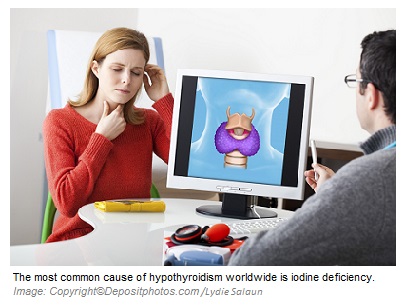 to a reduced production and low blood levels of thyroid hormones.
to a reduced production and low blood levels of thyroid hormones.
The thyroid gland picks up iodine from the blood and produces two related hormones, thyroxine (T4) and triiodothyronine (T3). Function of the thyroid gland is controlled by TSH (thyroid-stimulating hormone). It is a hormone released from the pituitary gland.
Signs and symptoms of low function thyroid are fatigue, tiredness, dry skin, hair loss, constipation, weight gain, hoarse voice, poor memory, menstrual abnormalities, muscle weakness, puffy face, hands and feet, cold intolerance, increased cholesterol level, anemia, cold extremities, and carpal tunnel syndrome.
Potential causes of hypothyroidism:
- Autoimmune hypothyroidism: Hashimoto`s disease, and atrophic hypothyroidism.
- Surgical removal of the thyroid gland.
- Medications: excessive intake of iodine, lithium, anti-thyroid drugs, para-aminosalicylic acid, alpha-interferon, and aminoglutethimide.
- Radiation therapy of the neck.
- After pregnancy.
- Inflammation of the thyroid.
- Tumors of the pituitary and hypothalamus glands.
- Medical conditions: Sheehan`s syndrome, amyloidosis, sarcoidosis, and scleroderma.
- Hormonal imbalances among estrogen, progesterone, DHEA, and cortisol.
- Nutritional deficiencies: iodine, tyrosine, selenium, zinc, and copper.
Nutritional Supports:
Restricted Foods:
- Goitrogens:
- Vegetables from brassica family (kale, broccoli, cauliflower, turnips, cabbage, Brussels sprouts, radishes, collard greens, kohlrabi, Bok Choy, rapini, mustard greens, rutabaga, horseradish, arugula, maca, wasabi, and watercress). These vegetables contain a phytonutrient called Isothiocyanate, which interferes with the uptake of iodine. Isothiocyanate is inactivated by cooking the vegetables.
- Soybeans.
- Peanuts.
- Pine nuts.
- Millets.
- Cassava root.
- Regular tap water, as it contains fluoride and chloride. They may block the absorption of iodine.
- Saturated and Trans fats.
- Soy.
- Spinach.
- Peaches, pears, and strawberries. They may increase chance of developing goiter.
- Sugars and sweets.
- Alcohol.
- Food additives, preservatives, and colourings.
Recommended Foods:
- Plenty of filtered water: at least 2 liters a day.
- Whole grains.
- Foods high in fiber.
- Foods high in Omega-3: flaxseeds, walnuts, chia, and hemp seeds.
- Sea vegetables: kelp, nori (laver), dulse, kombu, hijiki, spirulina, and wakame (alaria). They are rich in iodine.
- Fish.
- Nuts, except peanuts and pine nuts.
- Sea salt.
- Foods high in selenium: Brazil nuts, sea foods, tuna fish, sunflower seeds, beef, lamb, onions, wheat germ, brown rice, oats, barley, mushrooms (shiitake, and crimini).
- Foods high in zinc: beans, lentils, and sunflower seeds.
Recommended Supplements:
- Iodine: 150 – 300 mcg a day.
- Selenium: 100 – 200 mcg. It is an important mineral for the production of thyroid hormones.
- Bladderwrack: as capsules 200 – 600 mg a day, or as tincture 2 – 3 ml a day. It is a type of seaweed with active ingredients iodine, alginic acid and fucoidan.
- L – Tyrosine: 1000 – 1500 mg a day. This amino acid is important for the production of thyroid hormones.
- Zinc: 50 – 100 mg a day.
- Copper: 2 – 3 mg a day.
- French Maritime Pine Bark Extract: 100 – 200 mg a day. This flavonoid reduces inflammation and improves blood circulation.
- Grape Seed Extract: 50 – 100 mg a day.
- Omega – 3 Fatty Acids: 1- 3 grams a day.
- DHEA (dehydroepiandrosterone): 25 – 50 mg a day. It may improve thyroid function.
- Ashwagandha: 500 – 1000 mg a day. This herb reduces stress hormone level and improves thyroid hormones levels.
- Multivitamins – Multiminerals: A high potency product.
Miscellaneous Suggestions:
- Exercise.
- Liver detoxification.
- Colon cleansing.

